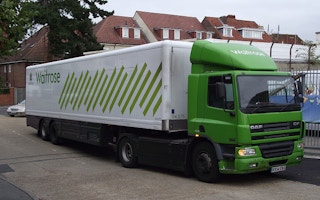A British supermarket has become the first retailer in Europe to use a new type of tank that keeps trucks motoring on fuel made from food waste for 500 miles, almost twice the current average.
The longer driving range - capacity had held back earlier green fuel options - could entice more business to turn to low-emission lorries and thereby help fight global warming.
“We will be able to make deliveries to our stores without having to refuel away from base,” Justin Laney of the John Lewis Partnership, which runs the Waitrose grocery chain, said in a statement on Thursday.
Gas provider CNG Fuels said the upmarket grocery chain had added 10 trucks to its fleet, all powered by renewable biomethane gas, which emits 70 percent less carbon dioxide than diesel.
“
Renewable biomethane is far cheaper and cleaner than diesel, and, with a range of up to 500 miles, it is a game-changer for road transport operators.
Philip Fjeld, CEO,CNG Fuels
Transport accounts for about a quarter of Europe’s planet-warming emissions, which the European Union has pledged to cut by 40 per cent before 2030 under the 2015 Paris climate deal.
Biomethane gas is made from food waste, which is also a source of greenhouse gases.
The lorries, manufactured by Swedish truck maker Scania, can run on the green fuel for 500 miles, 200 miles more than the average, thanks to a carbon fibre tank that is lighter and holds more gas, the companies said in a joint statement.
Biomethane trucks’ low range was previously an issue for many European hauliers and CNG Fuels CEO Philip Fjeld says they are now more likely to switch from diesel to natural gas.
“Renewable biomethane is far cheaper and cleaner than diesel, and, with a range of up to 500 miles, it is a game-changer for road transport operators,” he said.
Biomethane costs 40 per cent less than diesel and fuel savings are expected to cover the trucks’ extra costs in two to three years, according to the statement.
Developed by Scania and U.S. Agility Fuel Solutions, the system is already used by about 50,000 trucks in the United States. Fjeld said a handful of European companies had already requested quotes from his company.
An estimated 88 million tonnes of food is wasted in EU countries every year, costing about 143 billion euros ($153.61 billion), which activists say could feed the 55 million people living in food poverty in Europe more than nine times over.
This story was published with permission from Thomson Reuters Foundation, the charitable arm of Thomson Reuters, that covers humanitarian news, women’s rights, trafficking, property rights, climate change and resilience. Visit http://news.trust.org.










